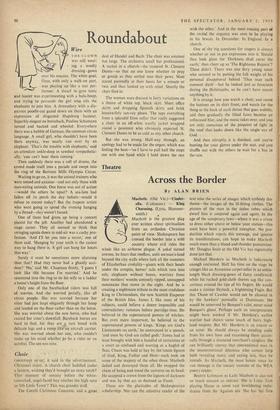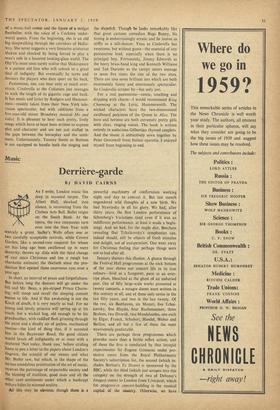Theatre
Across the Border
By ALAN BRIEN Macbeth. (Old Vic.)—Cinder- ella. (Coliseum.) — King Charming. (Lyric, Hammer- smith.) Macbeth is the greatest play ever written about spiritualism from an orthodox Christian point of view. Shakespeare has crossed the border into a wild country where evil rides the winds like an airborne plague. A yokel turned townee, he fears that roofless, unlit no-man's-land beyond the city walls where lurk all the monsters of Elizabethan credulity—giants with their heads under the armpits, horses' tails which turn into eels, elephants without bones, warriors from their mothers' wombs untimely ripped, unmapped mountains that move in the night. And he is creating a nightmare tribute to the most credulous King in Christendom, the new Scottish Emperor of the British Isles. James I, like most of his subjects, could believe a dozen impossible and contradictory rumours before porridge-time. He believed in the supernatural, powers of witches. But even more important, he believed in the supernatural powers of kings. `Kings are God's Lieutenants on earth,' he announced in a speech, `and even by God are called gods.' James had at least brought with him a handful of certainties to a court as confused and warring as a bagful of fleas. Chaos was held at bay by the' totem figures of God, King, Father and Host—each took on some of the majesty of the other three. Macbeth defied and destroyed them all. He snapped the chain of being and stood the universe on its head. He accepted a crown from the legions of darkness and was by that act as damned as Faust.
These are the platitudes of Shakespearian scholarship. Nor can the attentive reader of the text miss the series of images which embody this theme—the images of the ill-fitting clothes. The picture of the man in the stolen robes which dwarf him is conjured again and again. In the age of the sumptuary laws—where it was a crime to dress either above or below your station—this must have been a powerful metaphor. No pro- duction which rejects this message, and ignores its manifestations, can hope to make Macbeth much more than a blood-and-thunder pantomime. Mr. Douglas Seale at the Old Vic has regrettably done just that.
Michael Hordern as Macbeth is ludicrously enough costumed. Half his time on the stage he cringes like an Armenian carpet-seller in an ankle- length black dressing-gown of fuzzy candlewick while his ruched gold-cloth sleeves sag like con- certinas around the tips of his fingers. He would make a sinister Shylock, a frightening Fagin. But this Thane of Cawdor would not be allowed in by the hawkers' portcullis at Dunsinane. He would be unnerved by Banquo's valet, never mind Banquo's ghost. Perhaps such an interpretation might have worked if Mr. Hordern's earlier warrior had shown some touch of hairy high- land majesty. But Mr. Hordern is an ironist as an actor. He should always be standing aside from his own lines and examining them quizzi- cally through a diamond merchant's eyeglass. He can brilliantly convey that conventional man in the unconventional dilemma who cannot help both revealing more, and saying less, than he intends. As Macbeth, the most heroic voice he can manage is the uneasy tremolo of the WEA poetry reader.
Beatrix Lehmann as Lady Macbeth is also not so much miscast as outcast. She is Little Tich playing Dame in some vast bewildering melo- drama from the Agatian era. She has the face of a music-hall comic and the figure of a midget footballer, with the voice of a Cockney under- world queen. From the beginning, she is an old lag sleepwalking through the corridors of Hollo- way. She never suggests a very feminine aristocrat shaken and shocked by being forced to play a man's role in a haunted looking-glass world. The Old Vic must soon surely realise that Shakespeare is a patient old lion who will submit to a great deal of indignity. But eventually he turns and devours the players who dare sport on his back.
Pantomime, too, can bear only so much over- strain. Cinderella at the Coliseum just manages to walk the length of its gigantic cage and back. It has music and lyrics by Rodgers and Hammer- stein—mainly taken from their New York tele- vision spectacular, but with additions from a five-year-old minor Broadway musical Me and Juliet. It is pleasant to hear such pretty, lively songs which have at least been written to express plot and character and are not just stuffed in the gaps between the horseplay and the senti- ment. Unfortunately, Tommy Steele as Buttons is not equipped to handle both the singing and the slapstick. Though he looks remarkably like that great cartoon comedian Bugs Bunny, his timing is embarrassingly erratic and he moves as stiffly as a stilt-dancer. Yana as Cinderella has sweetness, but without gusto—the essential of any pantomime lead, especially when there is no principal boy. Fortunately, Jimmy Edwards as the beery brass-band king and Kenneth Williams and Ted Durante as the campy sisters manage to seem five times the size of the two stars. There are also some brilliant sets which are both enormously funny and enormously spectacular. So Cinderella scrapes by—but only just.
For a real pantomime—comic, touching and dripping with charm—I would recommend King Charming at the Lyric, Hammersmith. The wicked characters have the two-dimensional cardboard perkiness of the Queen in Alice. The hero and heroine are both extremely pretty girls with clear, ringing voices. The book is written entirely in audacious Gilbertian rhymed couplets. And the music is attractively sewn together by Peter Greenwell from Italian operetta. I enjoyed myself from beginning to end.











































 Previous page
Previous page